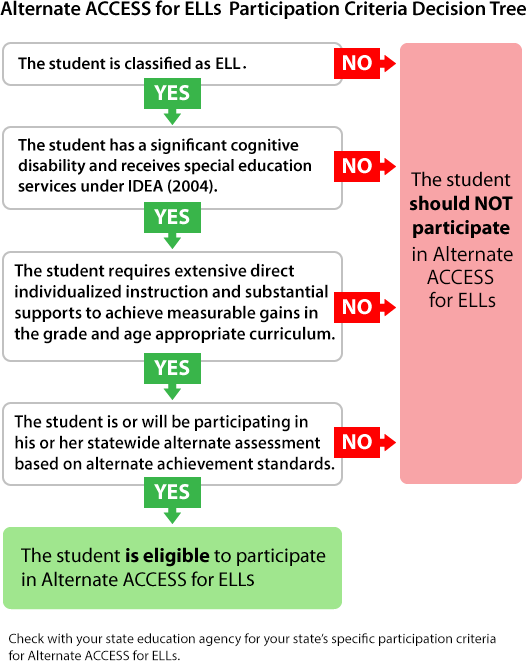-
Overview of Alternate ACCESS for ELLs
Alternate ACCESS for ELLs is an assessment of English language proficiency (ELP) for students in grades 1 -12 who are classified as English language learners (ELLs) and have significant cognitive disabilities that prevent their meaningful participation in the ACCESS for ELLs assessment. WIDA created the Alternate ACCESS for ELLs to meet federal accountability requirements and to provide educators with a measure sensitive to English language proficiency growth of ELLs with significant cognitive disabilities.
For more information about the Alternate ACCESS for ELLs visit the WIDA Website.
-
Participation Criteria
IEP teams decide whether students who are classified as ELLs with significant cognitive disabilities participate in Alternate ACCESS for ELLs and follow specific criteria designed to help IEP teams determine whether Alternate ACCESS for ELLs is an appropriate test for students. WIDA Participation Criteria


-
Alternate Model Performance Indicators (AMPIs)
The test is based on Alternate Model Performance Indicators (AMPIs), which provide expectations of what students should be able to process and produce at a given Alternate ELP level. To accommodate the three Alternate ELP levels (i.e., Initiating, Exploring, Engaging), AMPIs were developed for each language domain, standard, and grade-level cluster:
- Language Function (indicate, match, locate)
- Example Topic (text element)
- Form of Support (sensory, graphic and interactive)
-
Alternate Language Proficiency Levels
Alternate ACCESS for ELLs aligns with the WIDA Alternate English Language Proficiency levels.
These levels were designed to measure students language proficiency who have significant cognitive disabilities. The alternate ELP levels give students a chance to demonstrate progress within Level P1.
All Alternate ACCESS for ELLs test items are written from AMPIs and MPIs from four of WIDA’s ELD standards.




